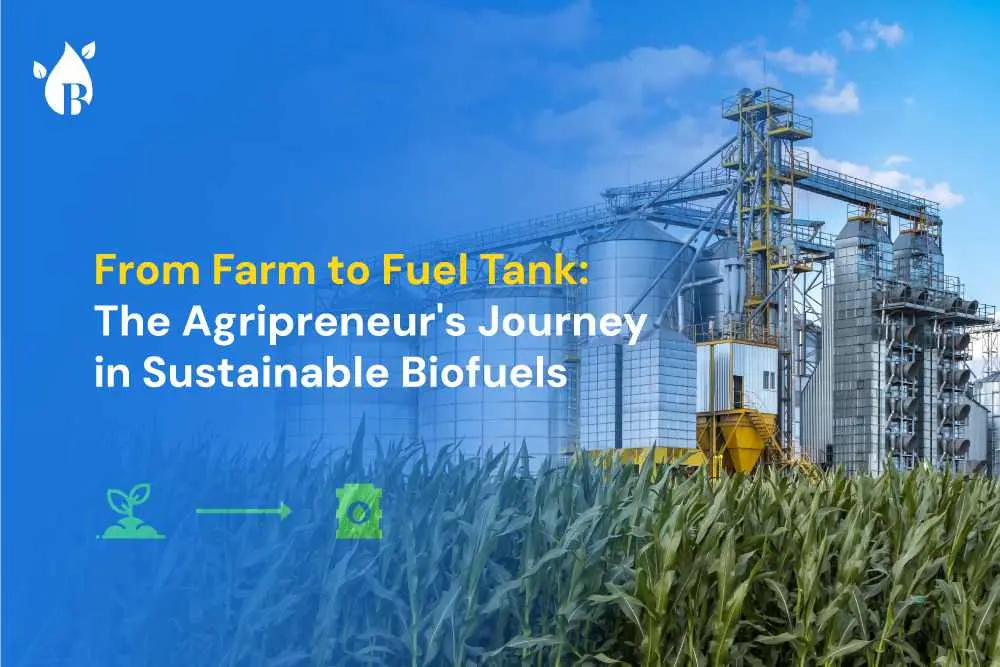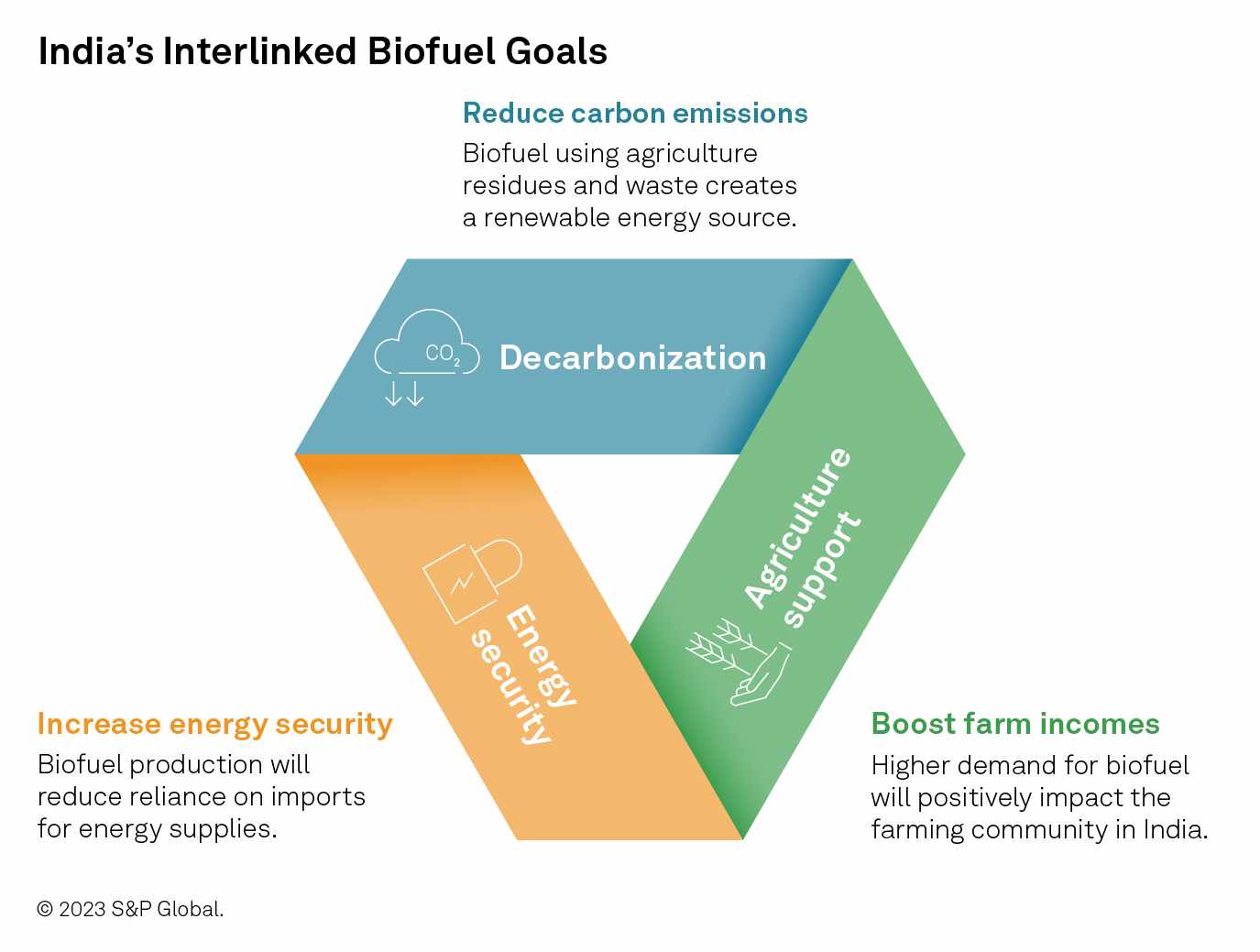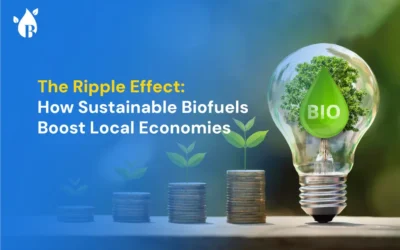
Farmers play a critical role in the entire process, from cultivating crops to powering fuel tanks. In this blog, let’s navigate the journey of the agriculture sector and sustainable biofuels such as bioethanol and biodiesel in India.
India’s economic landscape is predominantly agricultural. Although agriculture contributes slightly over 17% to the USD 2.6 trillion economy, it plays a pivotal role in employment, engaging over 60% of the population. India has successfully achieved self-sufficiency in food grain production, fostering robust and rapid economic growth in recent years, a trajectory expected to persist. With distinctive competitive strengths, including the largest arable land area at 60.44 percent of an estimated 179.8 million hectares and diverse agro-climatic conditions conducive to cultivating a wide array of crops, the country holds a unique position in the agricultural domain.
Entering the Biofuel Connection
The trajectory of India’s food security transformed after the mid-1960s drought, catalyzed by the Green Revolution’s strategic blend of policies, technology, and investment. Now, as we stand at the crossroads of the 21st century, Indian agriculture seeks a similar synergy to align with contemporary goals of food security, energy security, and decarbonization.
Biofuels Can be a Key to Net Zero
Biofuels are a key player in moving towards a cleaner future. They have the potential to significantly cut down on greenhouse gas emissions. Biofuels use basic elements like sunlight, soil, and seeds, making them a renewable and sustainable energy source. Since biofuels come from biomass – organic material from plants and animals – using them instead of or mixed with regular fuels can help decrease our reliance on fossil fuels. This shift is a big step toward a transportation system that doesn’t rely as much on traditional fossil fuels, helping the environment in the process.
“The conversion of crop residues into biofuels instead of burning them has the potential to prevent up to 3 billion tons of carbon emissions, as stated by the UN’s Food and Agriculture Organization.”
Biofuels: A Win-Win for India
India, as the world’s third-largest energy consumer, grapples with import dependence, posing a sustained challenge to economic growth. Yet, the country’s vast farming population, generating approximately 18% of GDP, presents an opportunity. Farmers, deeply connected to their land, decide crops based on factors like location, soil, and climate. India ranks among the top producers globally for various commodities such as rice, wheat, and sugarcane. In the dynamic landscape of the evolving biofuel industry, farmers take on a crucial role, not only contributing to energy production but also championing sustainable practices. How is this achieved? The agricultural wastes or residues become valuable raw materials for biofuels. Biofuels emerge as a potential win-win solution, addressing energy challenges while creating an additional income stream for farmers.

If India successfully meets its targets, ethanol has the potential to save a significant amount of emissions—68 million metric tons of carbon dioxide equivalent (MMtCO₂e)—from 2022 to 2030, as estimated by S&P Global . To put this into perspective, that’s about 29 billion liters of gasoline or the emissions produced by 15 million gasoline-powered vehicles annually. Meeting bioethanol goals aligns with India’s commitment made at COP26 to slash 1 billion metric tons of projected carbon emissions by 2030 and reduce the carbon intensity of its economy by 45% compared to 2005 levels.
Additionally, the conversion of crop residues into biofuels instead of burning them has the potential to prevent up to 3 billion tons of carbon emissions, as stated by the UN’s Food and Agriculture Organization. This not only contributes to emission reduction but also has the added benefit of improving air quality.
How Biofuels are Made and Used
Bioethanol: Bioethanol, known as ethyl alcohol, ethanol, E10, E15, or E20, is a renewable fuel primarily produced from sugarcane and occasionally from other waste by-products. It is the most widely used renewable fuel in India, contributing to the country’s overall fuel production. The blending of ethanol with petrol offers dual benefits. Firstly, ethanol being a biofuel, it helps in reducing the impact on the environment. Secondly, it aids India in reducing its dependency on crude oil imports and lowering associated costs.
Furthermore, ethanol blending has a positive impact on both the environment and human health. India has plans to introduce the use of 20% ethanol-blended petrol in the near future, indicating a commitment towards sustainable fuel options. Presently, most petrol pumps in India offer petrol blended with 10% ethanol.
Biodiesel: Biodiesel, another form of biofuel, is crafted from sources like recycled cooking oil, palm stearin, and animal fats. It provides a clean alternative for larger vehicles such as trucks and heavy farm equipment in the USA. In India, the government is aiming for an ambitious target of having 5% biodiesel in diesel by 2030, leading to various initiatives promoting local biofuel production. This policy overview aims to accelerate the adoption of biodiesel blending in India. It puts forth a series of policy suggestions covering different aspects, including the evaluation of available land and its potential, options for locally sourced materials, land requirements, reducing feedstock and biodiesel costs, both short and long-term strategies, and outlining the roles of the government and other relevant organizations in achieving this goal.
The Green Fuels Marketplace: Buyofuel as a Catalyst
In this journey, a pivotal player is the green fuels marketplace, and Buyofuel stands as a beacon of innovation. Agripreneurs find a platform to negotiate, buy, and sell biofuels, creating a network that transcends traditional agricultural boundaries. Buyofuel becomes more than a marketplace; it transforms into a community of empowered agripreneurs driving the sustainable biofuels movement.



